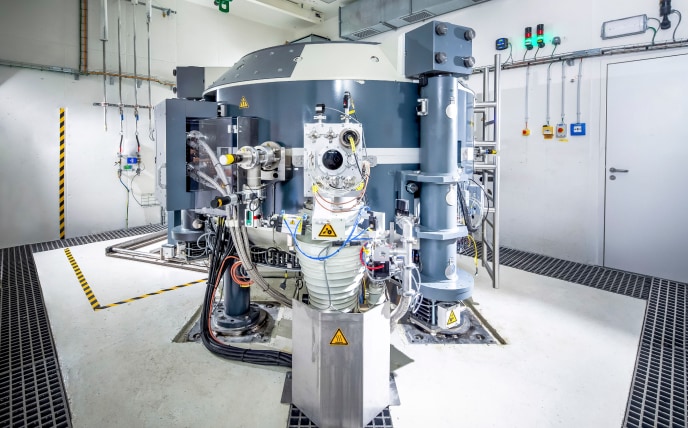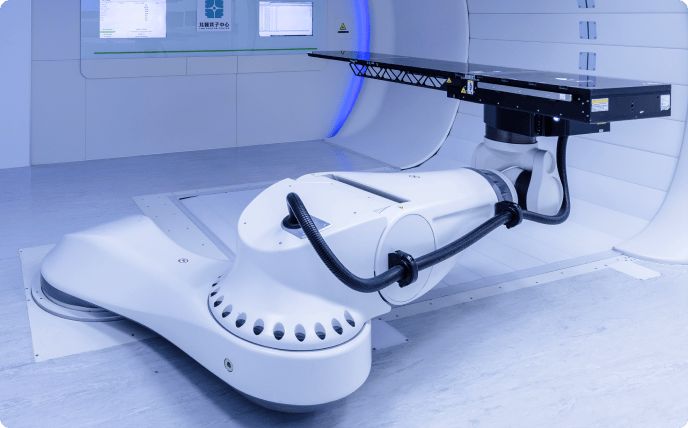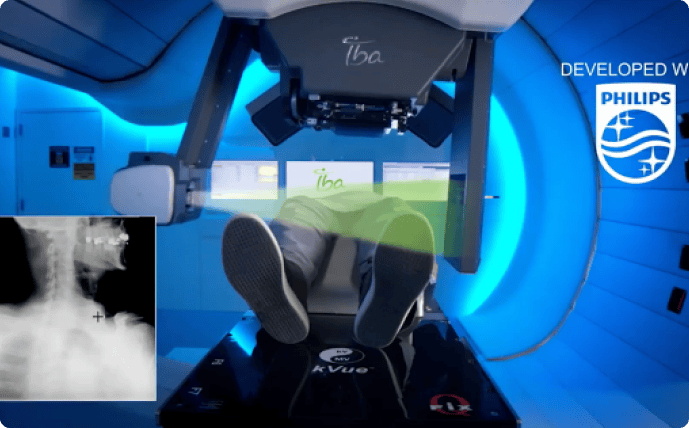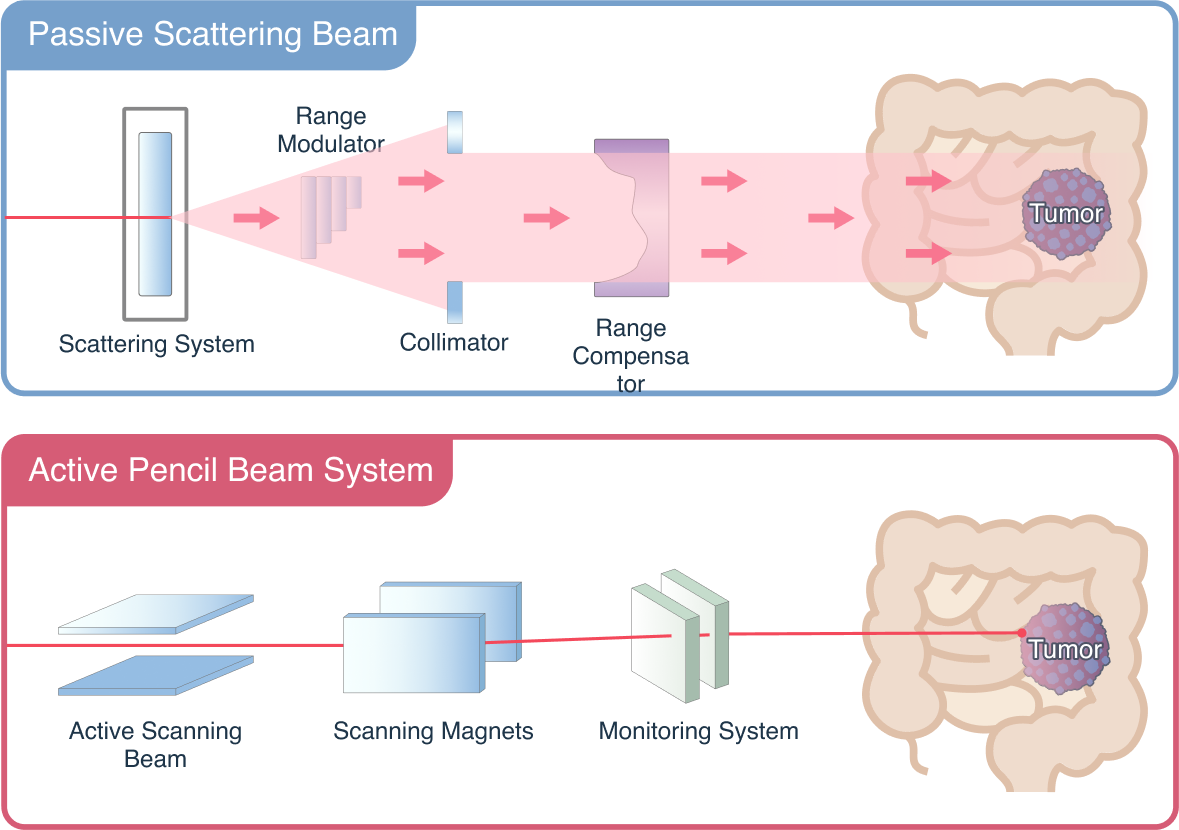
Taipei Medical University Proton Therapy Center
Taiwan’s First Superconducting Synchrocyclotron | First Proton Therapy Center in Taipei Metro Area
Proton therapy is an advanced form of radiation therapy and a growing trend of cancer treatment in leading medical centers worldwide.
Taipei Medical University (TMU) Proton Therapy Center utilizes a compact,
superconducting proton therapy machine featuring Asia’s first Superconducting Synchrocyclotron (S2C2),
Pencil Beam Scanning Intensity-Modulated Proton Therapy (PBS-IMPT), a 6D Robotic Couch, and Cone Beam Computed Tomography (CBCT) image-guided navigation. These advanced technologies represent a new milestone for cancer treatment within the TMU healthcare system.
Taipei Medical University (TMU) Proton Therapy Center utilizes a compact,
superconducting proton therapy machine featuring Asia’s first Superconducting Synchrocyclotron (S2C2),
Pencil Beam Scanning Intensity-Modulated Proton Therapy (PBS-IMPT), a 6D Robotic Couch, and Cone Beam Computed Tomography (CBCT) image-guided navigation. These advanced technologies represent a new milestone for cancer treatment within the TMU healthcare system.
Superior of TMU Proton Therapy
The TMU superconducting systemis one-fifth the size of traditional proton therapy systems, reducing the space required from the size of a football field to that of a tennis court. This efficient and energy-saving system allows a proton therapy center to be established within urban areas, close to the TMU campus, hospitals, and residential buildings. Built entirely underground with the highest safety standards against radiation, earthquakes, and flooding, the project overcame significant engineering challenges and stringent regulatory oversight.
Since proton therapy usually involves multiple treatments, establishing the center in a convenient urban location greatly enhances accessibility for patients, eliminating long-distance travel.
Play Video
Shared Platform and Continuous Upgrades
The TMU Proton Center features a fully integrated proton therapy machine with continuous upgrades directly from the manufacturer.
In addition to routine precision proton therapy, emerging technologies such as Proton Radiosurgery,
Arc Proton Therapy and the developing technique – Flash therapy can be seamlessly integrated and upgraded in the future.
TMU has also established a collaborative network with affiliated hospitals and other medical institutions to expand its services.
Through IBA’s global platform, TMU shares clinical experiences and research developments with internationally renowned proton centers such as Harvard universityand the University of Pennsylvania, ensuring continuous technological upgrades and collaboration.
Arc Proton Therapy and the developing technique – Flash therapy can be seamlessly integrated and upgraded in the future.
TMU has also established a collaborative network with affiliated hospitals and other medical institutions to expand its services.
Through IBA’s global platform, TMU shares clinical experiences and research developments with internationally renowned proton centers such as Harvard universityand the University of Pennsylvania, ensuring continuous technological upgrades and collaboration.







 S2C2
S2C2




 6D ROBOTIC COUCH
6D ROBOTIC COUCH


 PBS-IMPT
PBS-IMPT
 CBCT Image-Guided
CBCT Image-Guided


SUPERCONDUCTING SYNCHROCYCLOTRON (S2C2)
SUPERCONDUCTING SYNCHROCYCLOTRON (S2C2)
The particle accelerator is the core of the proton therapy system, accelerating protons to high speeds necessary for cancer treatment. Unlike conventional cyclotrons or synchrotrons, TMU’s Proton Center uses Asia’s first Superconducting Synchrocyclotron (S2C2) by European manufacturer IBA.
Superconducting technology significantly reduces the machine’s size and energy consumption, enabling the establishment of a proton therapy center within a densely populated metropolitan area.
This accelerator produces precise, high-energy proton beams tailored to treat tumors at varying depths with minimal impact on surrounding healthy tissues.


6D ROBOTIC COUCH
6D ROBOTIC COUCH
To optimize precision in proton therapy, the TMU Proton Center utilizes a 6D robotic treatment couch capable of moving in all directions—forward, backward, left, right, up, down, and rotating 360 degrees. This allows treatment from angles that traditional radiation therapy machines cannot achieve. Combined with CBCT imaging before each treatment session, patient positioning can be adjusted in real-time, ensuring the most accurate therapy delivery.


PENCIL BEAM SCANNING INTENSITY-MODULATED PROTON THERAPY (PBS-IMPT)
PENCIL BEAM SCANNING INTENSITY-MODULATED PROTON THERAPY
Unlike older passive scattering proton therapy, the TMU Proton Center employs advanced Pencil Beam Scanning technology. This technique uses a narrow, precise proton beam directed by magnets, conforming accurately to the shape and size of tumors.
PBS-IMPT significantly reduces radiation exposure to surrounding healthy tissues, making it especially beneficial when treating tumors near sensitive structures.
PBS-IMPT significantly reduces radiation exposure to surrounding healthy tissues, making it especially beneficial when treating tumors near sensitive structures.
Additionally, it allows for precise dose adjustments within tumors, ensuring even distribution and effectively treating multiple tumors within a targeted area.
和大范围被动散射技术相比,笔型射束能更精确顺型的针对治疗目标进行打击

Cone Beam Computed Tomography (CBCT) Image-Guided
Precision targeting is crucial in proton therapy due to its sensitivity to anatomical and tissue density variations.
The TMU Proton Center employs Cone Beam Computed Tomography (CBCT) imaging, providing clear, real-time images that verify and adjust patient positioning before each treatment. This ensures that proton beams precisely target the tumor, minimizing damage to surrounding healthy tissues. CBCT also enables adaptive treatment planning, adjusting the therapy plan based on changes in tumor size or location during treatment.


Respiratory Motion Management System
Controlling tumor movement caused by breathing is critical for precise proton therapy, especially for cancers located in the chest, lung, and upper abdominal areas.
TMU Proton Center employs active and passive respiratory control systems, including Active Breathing Control (ABC) techniques, respiratory gating, and respiratory tracking.
These techniques synchronize radiation delivery with the patient’s breathing cycle, reducing the impact of tumor movement.
The medical team selects the best approach based on the patient’s specific clinical needs.
Play Video
Cutting-Edge Medical Equipment and Personalized Integrated Care
Develop personalized integrative treatment plan
TMU Proton Therapy Team provides personalized treatment plans, integrating advanced proton therapy with multi-disciplinary cancer care.
Our approach combines top-tier medical technology, expert clinical teams, and customized treatments to deliver outstanding cancer care tailored specifically to each patient’s needs.
Our approach combines top-tier medical technology, expert clinical teams, and customized treatments to deliver outstanding cancer care tailored specifically to each patient’s needs.




Online Appointment
We warmly invite you to schedule an online consultation. Our dedicated team will reach out to you promptly.
GET IN TOUCH.

